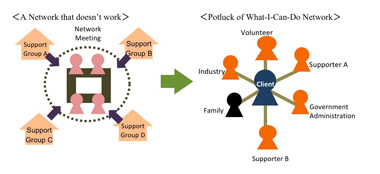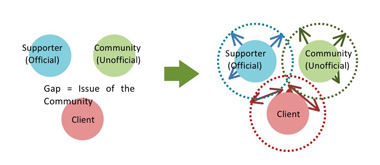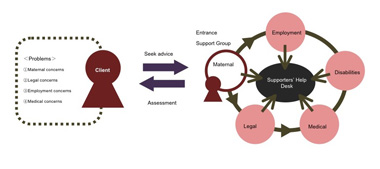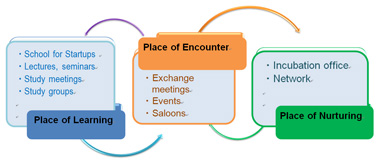A Report on “Potluck of What-I-Can-Do Workshop Manual” & “Building Up Support Project”
~ Concrete Steps towards an Interrelated and Supportive Community ~
Summary
IV. Synthesis and Challenges
< Synthesis and Challenges >
To be able to support someone who is shouldering problems that come in bundles and is isolated from the society, one supporting group or a single supporter should not help deal with his problems all alone. A “flexible network with diverse connections” and a “realistic network with the power to make things happen” are necessary. But we have also experienced the difficulty of breaking and going beyond the walls between the different fields of specialization to connect the supporters with the experts.
The “Potluck of What-I-Can-Do Workshop” and “Building Up Support Project” were developed to break down these walls. These involved 84 organizations from three areas of Aichi Prefecture with their respective fields of expertise. These groups gathered together with the aim of finding a way of not giving up on a “hopeless case,” or an issue which is too difficult to resolve. The supporters, communities, and the clients themselves brought in what they could do to achieve this. In addition, they were able to go beyond the realm of their fields and positions and share with each other the feeling that they were not alone. They have learned to pursue together the possibility of resolving difficult cases and issues, no matter how difficult these may be.
What we discovered during the process was the fact that a network is: 1) problem-centered, 2) a relationship among a diverse group of people based on trust, 3) established by realizing the potential of what each and everyone can do when bringing in those resources.
|
|
◊ The relationship born from the Potluck of What-I-Can-Do Workshop and the results it brings about:
1. To focus our outlook on the possibilities:
The supporters, the community, and the client him/herself can share the strengths and expertise, which they did not realize they had, by searching the possibilities in the relationship they have established. By understanding the human nature of each and every member and transforming their skills into resources, the number of ways and ideas for solving the problem will increase. Furthermore, these resources can be utilized not only in resolving the problems of a single client, but also in approaching the issues of the community as well.
2. Instead of making an excuse, bring in what can be done:
To promote a network which is trustworthy and safe, we should stop making excuses on why the problem cannot be resolved. Instead, we first need to establish a relationship among the supporters so they can confidently bring in their capabilities. Regardless of the difficulty of the problem brought into the support organization, the network members will constantly support each other by making use of their respective fields of expertise. For problems that still cannot be resolved, the involvement of its diverse members can give a holistic support through the establishment of a relationship where consultations and exchange of ideas eradicate the fear of tackling a difficult case.
3. Learn and connect not as a member of the organization but as an individual:
When participating in a network as a representative of the organization you are affiliated with, there may be a tendency for you to hesitate to some extent in coordinating with the other organizations in order to avoid increasing the burden on your own affiliated organization. If we can put the client’s concerns at the center of the gathering and establish a relationship whereby consultations and discussions can be done without hesitation, we will gradually be able to connect with one another not just as a member of an organization but as one of the key persons involved in solving the client’s concerns.
It is our mission to keep searching within these “Potluck of What-I-Can-Do” networks for a new societal direction and role in an effort to create a “society where nobody will be isolated.” Instead of giving up on trials and problems and saying “it cannot be helped…,” we would like to take on the challenges and face them as a single team. To do so, we should continue practicing the “Potluck of What-I-Can-Do” through trial and error.
◊ Challenges
In the midst of increasing our practice and experience with the Potluck of What-I-Can-Do principle in solving the problems and difficult cases of the community, we would also like to make headway in addressing the following matters in the future.
1. A General Help Desk for Supporters
The supporters’ problems and dead ends are also the client’s problems and dead ends. It is important for the supporters to have a good relationship with one another where they can be each other’s consultants and thus support each other with reciprocity.
Someone whose multiple problems have piled up usually seeks advice with a support organization. However, those problems that are beyond the scope of that organization’s field of expertise could become unaddressed and put aside (cf. p. 5). No matter which support organization was visited first and served as an entrance to the support system, there is a need to thoroughly listen to the client’s concerns. There may also be a need to refer him/her to other support organizations which are appropriate for addressing his/her concerns according to his/her request or development stage, and hold a conference together as a team. For this to happen, a “supporters’ general help desk” should be established, where the supporters can easily seek advice regarding the supporting skills and knowledge of the other organizations with various fields of expertise.
Those supporters or supporting organizations that responded to the client’s needs as the entrance to the support system should follow the steps for providing the needed support and lead the client to the next supporter, organization or an “escort runner” in an informal capacity. However, the support does not end there. They should continue monitoring the client even after he/she has been transferred to the next group of supporters. By doing so, the supporters of the client will increase in number, and the receiving support organization will also have easy access to the previous supporters when they encounter problems or meet a dead end. Continuing this process will create a diversity and sense of confidence and enrich the network.
2. Improvement of the assessment skills
When the network begins to function efficiently, all the components of the network, including the support organizations and their supporters, will be able to perform the function as the client’s entrance to the support system. They will thus be able to support, without missing anyone, those who are shouldering difficult problems and are isolated from the community. However, to execute such function effectively, every support organization and supporter should each possess the ability to make a thorough and accurate assessment of the clients. In order to make accurate assessments, all the members of the network should continue to study and learn how to improve and possess higher level assessment skills.
Kusanone Mutual Support Project (General Incorporated Association)
1. History
In April 2011, a small study meeting called the “Kusanone Project,” the predecessor of our modern-day association, was started. Kusanone means “grassroots” in Japanese. In April 2012, we became a general incorporated association. Many people faced with daily livelihood difficulties and whose lives have come to a halt due to various problems are isolated from society with no available support from social systems or help from other people. They struggle with isolation, alone in a dark place with no light at the end of the tunnel. We have continued our activities because we cannot be satisfied with leaving such situations unresolved.
2. Members
Membership of the Kusanone Mutual Support Project is diverse and unique. It consists of supporters in many different fields including disability, mother-child families, shut-ins and homeless people, as well as nurses, judicial scriveners, administrative officers, university teachers, company accountants, and system engineers. We treasure the diversity of ideas that arise because our members come from all walks of life.
3. Activities
1) Studies and research services
We conduct studies and research on poverty and isolation, such as the study we did in 2012 entitled “On the process of social isolation, poverty, and support mechanisms.”
2) Consultation support services
(1) Yorisoi Hotline (Helpline) – In operation since FY 2012
The Yorisoi Hotline accepts consultations from people faced with livelihood difficulties. We then connect them to appropriate problem-solving organizations through assessment and coordination.
(2) Nagoya City Youth Counseling Center - Commissioned in June 2013
To solve the social challenges of young people such as NEETs and shut-ins, we provide support through our multidisciplinary network centering on outreach and follow-up services.
3) Welfare services
(1) Dekoboko, an in-home long-term care provider - Opened in July 2013
This service provides welfare for persons with disabilities based on the Services and Support for Disabled Persons Act.
(2) Nekonote Bank (Bank of Helping Hands) - In operation since FY2012
With Yorisoi Hotline (Helpline) and the Informal Network functioning as starting points, volunteers provide livelihood support for those in need who are unable to access support systems for various reasons. Our goal is to ultimately help those in need to connect with mutual support mechanisms in the community.
4) Networking services
(1) Informal Network Nagoya
Multiple support organizations participate in this network to share cases that have not been settled by respective support organizations and regularly hold meetings to exchange opinions to support people faced with similar problems.
(2) Regional intermediary (Toyohashi City, Kariya City)
We provide network coordinating services in Toyohashi and Kariya, both established last year.
5) Workshop services
(1) Dekirukoto-mochiyori Workshop (Potluck Workshop)
Through a total of three workshops, respectively titled “Encounters,” “Recycling,” and “Organization,” support teams are formed by utilizing the strength of individual support organizations. This organization was developed on commission from Aichi Prefecture in FY 2012.
(2) Living Library
We hold workshops where the “books” of the Living Library are “people”. In the workshop, people with disabilities or those faced with livelihood difficulties participate as “books”. Readers borrow “books” by entering into dialogue with them.
(3) Kusanone Study Group (Kusa-Labo)
A regular meeting of the Grassroots Study Group is held once a month. Participation is not limited to supporters; the general public also is welcome to participate. Discussions are held on such topics as mutual support in the community or social inclusion.
6) Training and dissemination services
The following training services are implemented.
- Study meeting on strategies for livelihood support
- Helper training
- Training for livelihood support volunteers
- Training for helpline counselors
- Lectures
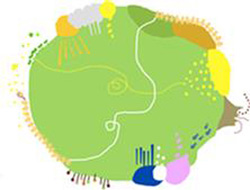
The logo of Grassroots Project for Mutual Support:
The logo depicts an Earth where people and animals, trees and volcanoes, and the sun and the rain, exist in harmony. It represents co-existence.
4. The existence of a place where people can give expression to their weaknesses and where people gather, with each bringing what he/she can (a potluck) will change society!
We can support the weaknesses of others by sharing our weaknesses with each other and accepting them with respect, while bringing along what we can. We have come to feel how rich, comfortable, and wonderful life can be by repeating this small “mutual support” with peers.
We are pursuing a society where everyone can express his/her weaknesses, acknowledge each other’s wonderful points, and can find a place in the community to be of help, and also a society where everyone can feel kindness and a connection with others. In such a society, we believe that no one will be isolated from the community.
Kusanone Mutual Support Project (General Incorporated Association)
5-6-1 Honjin-dori, Nakamura-ku, Nagoya, Aichi, 453-0041 Japan
Tel: +81-(0)52-462-1281
Email: kp.grassroots@gmail.com
Website: http://grassroots.jimdo.com/
NPO Support Net for Starting Small & Community Business
Principles:
We regard starting a business as “job creation, personal development and regional revitalization.” Our three main themes are; to let each and every person shine in his/her own way, to solve and improve the issues of the region, and to create an affluent community where “new benefits (which are equal to the new values)” that include money, work, information, joy and gratitude circulate vigorously. We hope to realize these three themes through our support for business startups.
Description of business:
- Support for starting a business through “School for Startups” and “Consultation for business startups and management”
- Follow-ups after business startups, individual consultation, support for collaborative activities, etc.
Illustration: We provide services that interact with one another while stepping up from the Place of Learning (School for Startups, lectures, seminars, study meetings and study groups) to the Place of Encounter (exchange meetings, events and saloons), and from the Place of Encounter to the Place of Nurturing (incubation office and network).
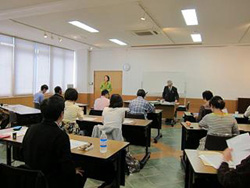
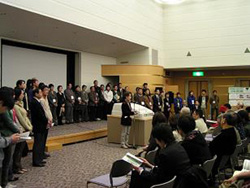
Left: Training seminar on support capability
Right: National summit on community business
History:
| 1992 | “Workers’ Eclat,” our predecessor, was founded. It worked on the support of women starting a business. |
| 1998 | “Support Net for Starting Small & Community Business” was established. We also worked for “Business startup contest” for community businesses. |
| 1998 | Received a non-profit organization authentication. |
| 2004 | Community Business Guidebook was published. |
| 2005 | School for Startups was opened (School has been and is held once a year) |
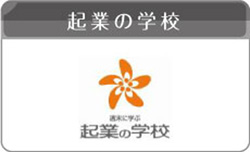 School logo |
School for Startups Opened in 2005 as a school for people who aim to start a community business appropriate to individual conditions to learn curriculums from the creation of principles up to the development of a business plan. Currently over 150 graduates are playing active roles in many different fields. |
Support for starting a community business appropriate to individual conditions
Community business is a business for changing, small the change may be, or creating the reality of the world by influencing the community (society) and responding to the requests of customers and peers.
What is demanded of the future society, regarding from how to connect with other people to how to run a business or what business approach to take, is to change values to the ones that will suit the viewpoint of life and the size and speed of people.
It is all right to be small. It is all right to be slow. It is fine not to be strong.
You need, however, to be prepared that starting a business is not “only” for self-fulfilling but for benefiting communities in ways appropriate to individual conditions.
Challenging the creation of new values…. Wouldn’t you like to meet the challenge of starting a community business appropriate to your conditions?
Seven months of study with peers, under the concept of “school”
Study techniques to design the future, with peers from diverse backgrounds
“School” has homework and tests. There are “peers” young and old, male and female, who have lived in very different types of environment and have totally different experiences. Based not only on the know-how of starting a business but also on the principle of “the purpose of starting a business,” the business plan will be developed together with peers.
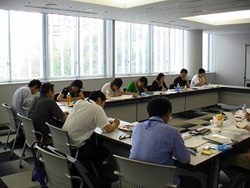
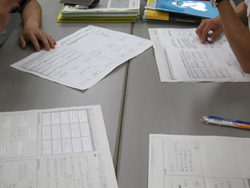
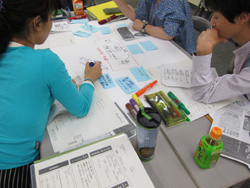
NPO Support Net for Starting Small & Community Business
2F, Chiiki-Shigen-Nagaya
6-1 5-chome, Honjin-dori, Nakamura-ku, Nagoya 453-0021 Japan
TEL +81-(0)52-486-4101 FAX +81-(0)52-486-4103
Email aile@npo-kigyo.net
URL http://www.npo-kigyo.net/
2012 New Public Support for NPO’s Development Projects of Aichi Prefecture
A Report on the Project to Create and Promote a Cooperative Network
Relative to Social Inclusion
A Report on “Potluck of What-I-Can-Do Workshop Manual” & “Building Up Support Project”
~ Concrete Steps towards an Interrelated and Supportive Community ~
March 2013
■ Planner & Editor: NPO Support Net for Small and Community Business - Kusanone Mutual Support Project Consortium
Chiiki Shigen Nagaya Nakamura
5-6-1 Honjin-dori, Nakamura-ku, Nagoya City, Aichi Prefecture 453-0041
TEL: 052-486-4101 FAX: 052-486-4103
E-mail: kp.grassroots@gmail.com

